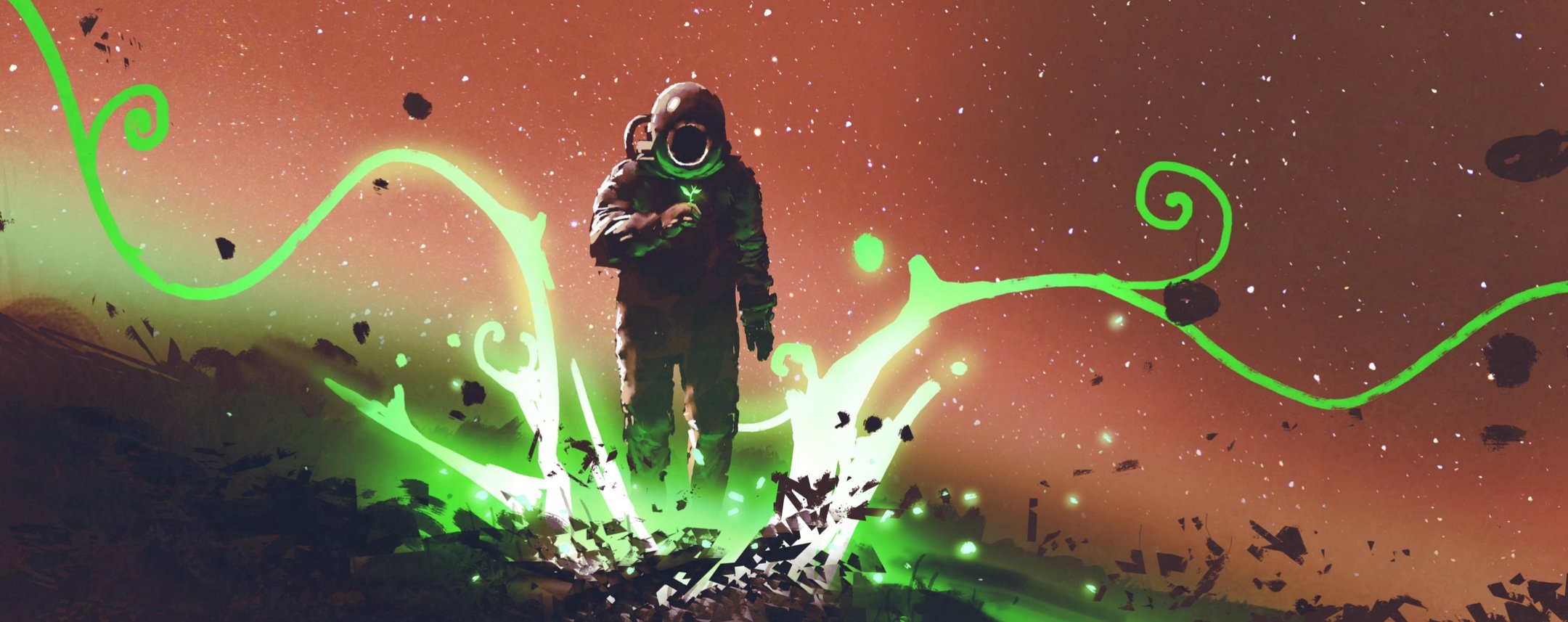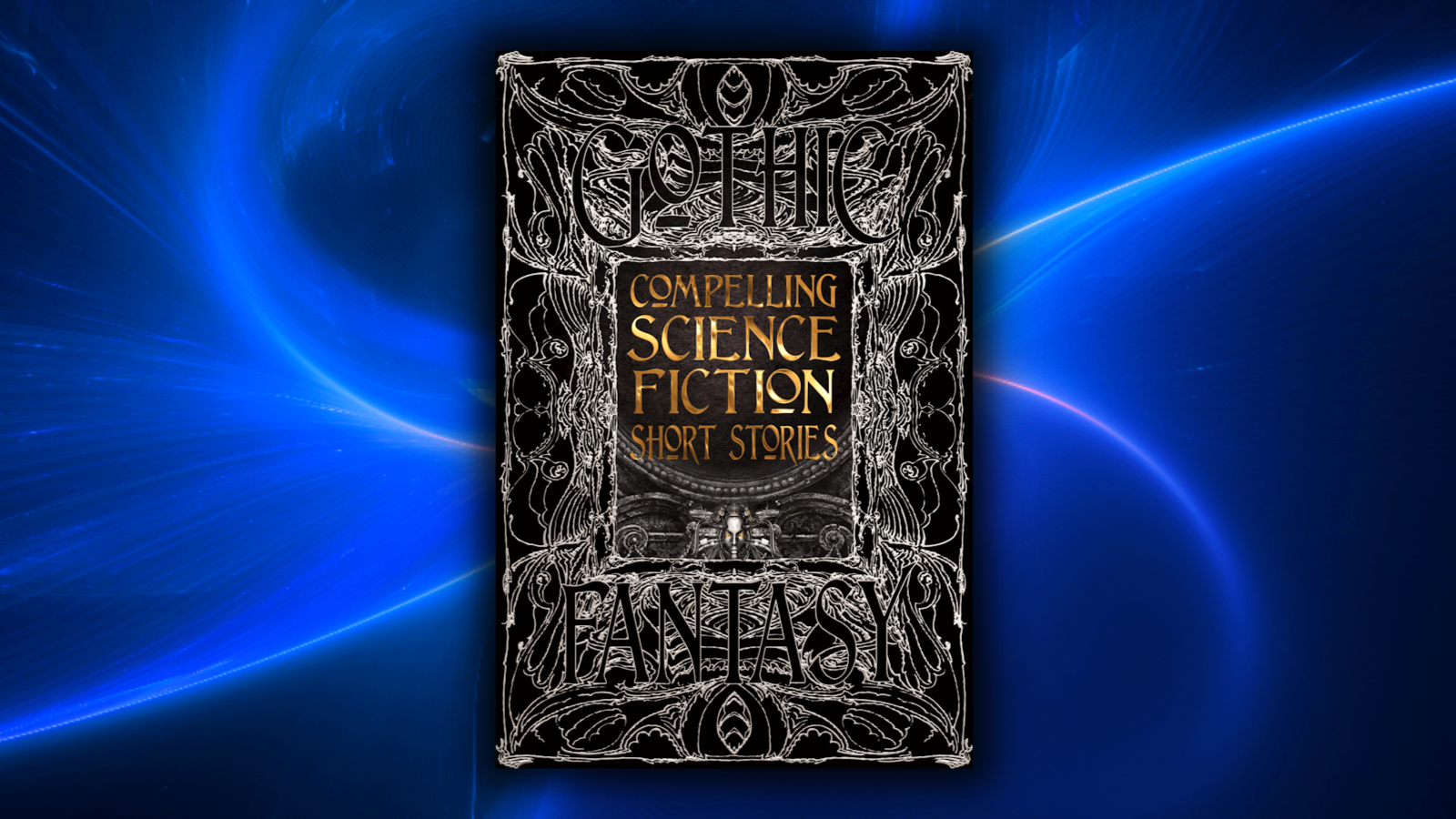Available to buy now, Compelling Science Fiction is our latest popular hardback anthology! In keeping with the style of the series, it combines new and recent fiction with classic works from the genre. A fascinating foreword is provided by Joe Stech, publisher of the Compelling Science Fiction magazine. In last week’s Q&A, some of the modern authors shared the inspiration behind their tales in the book. Now, they cast light on their various writing processes, and recommend other compelling science fiction stories – so you might want to prepare your TBR piles for some more additions!

What are your favourite stories from this genre?
Jonathan Ficke
Ted Chiang is incomparable: Stories of Your Life/Arrival is one of the finest pieces of fiction and adaptations for film I've ever experienced. In a similar vein, ‘The Urashima Effect’ by E. Lily Yu is another spectacularly introspective story. While I’ve always loved flashy adventures, space exploration, and excitement, there’s something about SF that allows for exploring interesting philosophical questions.
Voss Foster
I’m a huge fan of Stanislaw Lem. The stories in both The Cyberiad and Imaginary Magnitude I would consider formative to how I view science fiction. But I’m not completely stuck in the past. ‘Today I am Paul’ quickly entered my personal ‘greats’ canon after reading it the first time, and it’s hard to talk about amazing modern sci-fi without mentioning Nnedi Okorafor’s Spider the Artist.
Marie Vibbert
I’m a big time travel buff. Connie Willis’ To Say Nothing of the Dog and Doomsday Book have to be near the top. She goes beyond the what if’s of paradoxes, making complex plots that turn around complicated characters trying to make sense of the world. Also forgotten hits like the 2014 movie Edge of Tomorrow with Emily Blunt and Tom Cruise, or the Time Crimes which is a Spanish Language film you should check out. I love the many ways time travel can be worked around and twisted on itself.
P.A. Cornell
I grew up on the science fiction movies of the late 70s and 80s so my mind often goes to film when I think of the genre. Favourites from my childhood include the Star Wars and Alien franchises, and I’ll always have a soft spot for E.T. The Extra-Terrestrial. I of course read a lot in this genre too. Some of my favourite SF books include Mary Robinette Kowal’s Lady Astronaut series, Kameron Hurley’s The Light Brigade, and Martha Wells’ Murderbot series. There’s way too much great short fiction to name them all but I love practically anything by Ted Chiang or Sarah Pinsker.
Elaine Midcoh
Star Trek was a huge influence on my life, particularly in terms of believing in a hopeful future for mankind. I’m also a big fan of Rod Serling’s Twilight Zone stories. Inventive, surprising, but always the human element at its core. These days in my sci-fi reading I prefer the short story over the novel. Favourite authors include: Octavia Butler, Anne McCaffrey, Ray Bradbury, Ben Bova, Isaac Asimov, Peter David (especially his Star Trek books!).
Marshall J. Moore
My story in Compelling Science Fiction, ‘Exorphin’, is something of a sci-fi horror/found footage homage, so Ridley Scott’s Alien and the first Cloverfield movie both deserve mention. But honestly, now that I think about it, this story is basically just a darker variation on the classic Star Trek episode ‘The Trouble with Tribbles’.
Brian Trent
There’s so much to choose from. ‘Tomorrow’s Child’ and ‘R is for Rocket’ by Ray Bradbury, ‘Rescue Party’ by Arthur C. Clarke, The Island of Doctor Moreau by H.G. Wells, and of course Asimov’s Robot Series. The Twilight Zone was an important influence as well.
David Tallerman
In terms of humans trying to figure out ways of living in the less hospitable parts of our solar system, I’d be remiss if I didn’t mention Pohl’s classic Man Plus. But actually, the book that immediately comes to mind is Ian Sales’ marvellous novella Adrift on the Sea of Rains: anyone looking for a similar tale to ‘Across the Terminator’ (my story in Compelling Science Fiction) with more of a hard science bent would do well to give it a look, and then to keep on and read the rest of the series that it begins.
C.M. Shevlin
Most of the sci-fi stories I like fall more into the speculative fiction side with a flavour of the dystopian. Most recently I’ve discovered ‘The Ones Who Walk Away from Omelas’ by Ursula Le Guin. A really horrifying story about a prosperous society – Omelas; the twist is that its success is ‘paid’ for by the perpetual suffering of a single child. This is a philosophical theme that occurs again and again in sci-fi in different mediums – Star Trek used it more than once, and the ‘new’ Doctor Who as well.
Can you tell us a little about your writing process?
Deborah L. Davitt
I prefer to work sitting at my main computer, not the laptop. I try to write as much as possible at once, but I am also the sort of person who edits as they write. When I pick up on a second or third day of writing, it’s by editing what I wrote the previous day, so as to get back into the flow of the ideas. Most of my writing tends to be done at night these days; I used to be more of a daytime writer, but a number of things have knocked me out of my schedule, unfortunately.
Mike Morgan
I write late at night, after reading bedtime stories to my kids and saying goodnight to my wife, with two cats climbing all over me in the study. I write at my most exhausted, my eyes barely able to focus on the screen. I write after I’ve taken care of everyone and everything else in my life, when I should be sleeping. I write when the house is finally silent and the world is no longer angry with me. I write when everything is asleep, when I can finally hear the thoughts inside my own head.
Douglas Smith
Here’s an approximation of my process for a short story. My process for novels is similar but different (that’s helpful, isn’t it?). 1) Pick a story idea out of the many bouncing around in my brain, all whining to be written into life (the only way to shut them up). 2) Figure out the characters. That’s a constant with anything I write. If I don’t know my characters and their current pain, I don’t know the story. Because it’s their story, not mine. 3) Figure out an opening that introduces the main character and their pain in a way that will draw the reader in. Write that opening. Or maybe another scene. Doesn’t matter. Might even be the last scene. I like when the ending arrives early in the process – it gives me a target to aim for as I’m writing the story. 4) Revise that scene until I’m confident it will work. It’s not perfect yet (and never will be), but I know that it will work for the story. Write the next (or another) scene. Revise it until I’m happy that it, too, will work. Rinse and repeat until I have a full story. 5) Set it aside. A day. A week. Whatever. Long enough to come back to it with fresh eyes. 6) Revise it. Grammar check it, not to take every suggestion but to find things I missed. 7) Send it to my critique group. Incorporate the feedback I agree with. 8) Send it out to market. Keep it out there until it sells.
Adam Godfrey
I’m all over the place. Having ADHD, my mind is spinning all the time. I tend to squeeze writing time into the nooks and crannies of everyday life, wherever I’m able, coming in little bursts here and there and largely editing as I go until a work is completed. But I also tend to become extremely hyper-focused on a particular topic of interest, which is a symptom of my ADHD that drives my need to be as scientifically or technologically accurate as possible. For me, believability is in the details. If those fall short, the rest of the story will as well.
H.G. Silvia
I use a method I call Word Vomiting in which I simply get it all down while the idea is fresh, then edit (a bit). I am part of an excellent writers’ group, and I value their feedback as I continue my edits. In the last three years, I have softened my approach and often dwell on a story idea – sometimes for weeks – before I start writing. Oftentimes the story comes out fully formed as if I’ve watched a film and am merely transcribing it.
Larry Hodges
I do about 90% of my fiction writing at Panera’s, where I can always get the essentials – a booth, wireless, Dr Pepper, and I still like the menu after all these years. I have nothing to do there except write…so I write and sip Dr Pepper. As to my actual writing process – here are some pages that explain it: Larry’s Twenty-Point Short Story Writing System; Larry’s Short Story Writing Checklist; Fifty Writing Quotes.
Pauline Barmby
I try to be disciplined about writing nearly every day, but when that happens depends on the rest of my life. I write in GoogleDocs on a tablet and am definitely of the ‘write a terrible first draft as fast as possible, then make it better’ persuasion. My writing and my attitude toward it both owe a lot to online writing communities, and I’d encourage new writers to find their people: you don’t have to do this alone!

The book is available to buy now – get your copy here!
Links
- Did you miss the first part of this Q&A? Catch up with Part 1, where authors discuss the inspirations behind their stories.
- See the full list of authors in this book.
- Browse the full collection of Flame Tree anthologies.
.png?width=3041&height=620&name=Beautiful%20books%2c%20Timeless%20storytelling%20(4).png)


